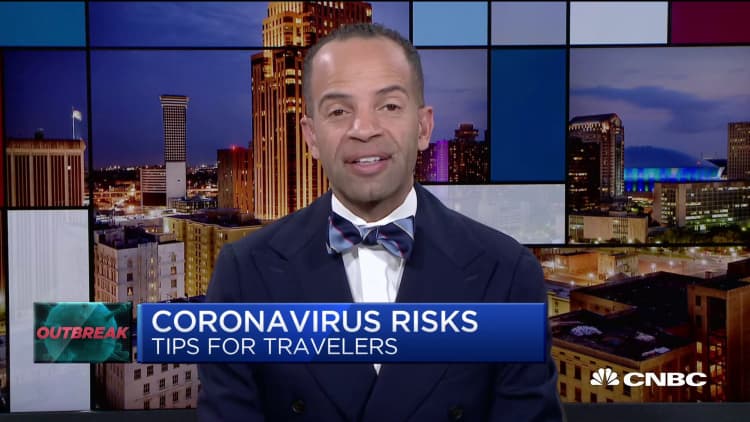The "most important" way to stop the spread of China's coronavirus is to wash your hands, according to the professor who headed the World Health Organization's (WHO) global response to SARS.
China's National Health Commission on Tuesday confirmed 20,438 cases of the coronavirus in the country and 425 deaths.
The outbreak of the deadly pneumonia-like virus, which is thought to have originated in the Chinese city of Wuhan, has been recognized as a global health emergency by the WHO.
As of Monday, there were thought to be nearly 200 cases of the virus in at least 23 countries outside of China.
"One of the most important ways of stopping respiratory outbreaks such as this is washing hands," David Heymann, who led WHO's infectious disease unit at the time of the SARS epidemic in 2002-2003, said at a Chatham House press briefing in London on Tuesday.

That's because "if you touch a patient, if you shake hands, if you touch a door that has a droplet on it — which could theoretically happen — then you touch your face (or) your mouth and you become infected."
"So, handwashing is the most important. And second is, people who are suspected as being patients, be very careful when you are dealing with them. Avoid face-to-face contact and wash hands when you're treating," Heymann said.
"It is very important that people understand that they can prevent themselves from being infected if they follow a few simple measures," he added.
'Not a lot of evidence' to support wearing masks
Late last month, health experts told CNBC that the panic buying of face masks to protect against the coronavirus was "completely understandable," but ultimately unwarranted.
They also warned a shortage of masks could pose a risk to health workers.
It was thought wearing masks might be useful if you're sick in order to prevent you from sneezing or coughing into somebody's face, Heymann said.
But, "a mask that is used to stop getting an infection is sometimes not very effective because people take it off to eat, many times they are worn improperly (and) if they get wet and somebody sneezes on that mask it could pass through. So, there is really not a lot of evidence (to support wearing masks)."
"I would think that there is way too much wearing of masks although some places like Hong Kong have required that people on the underground use masks — and that is their sovereign right to do that. That is their risk assessment," he added.
Coronaviruses are a large family of viruses that usually infect animals but can sometimes evolve and spread to humans.
Symptoms for people tend to include fever, coughing and shortness of breath, which can progress to pneumonia. Physicians have compared it to the 2003 outbreak of SARS, which had a short incubation period of two to seven days.
During the period of infection for SARS (2002-2003), there were nearly 8,098 reported cases and 774 deaths, according to the WHO. It means the virus killed roughly one in 10 people who were infected.
Rampant misinformation
Heymann's comments come at a time when the WHO has repeatedly warned against rampant misinformation about the virus online.
At least 16 people have been arrested over online posts relating to the coronavirus in Malaysia, India, Thailand, Indonesia and Hong Kong, Reuters reported Tuesday.
"It is time for facts, not fear," WHO's Director-General Tedros Adhanom Ghebreyesus said via Twitter on Saturday.
"We appreciate Google, Facebook, TencentGlobal, TikTok and Twitter's efforts to combat misinformation and rumors on #2019nCoV & direct users to reliable sources," he added.


